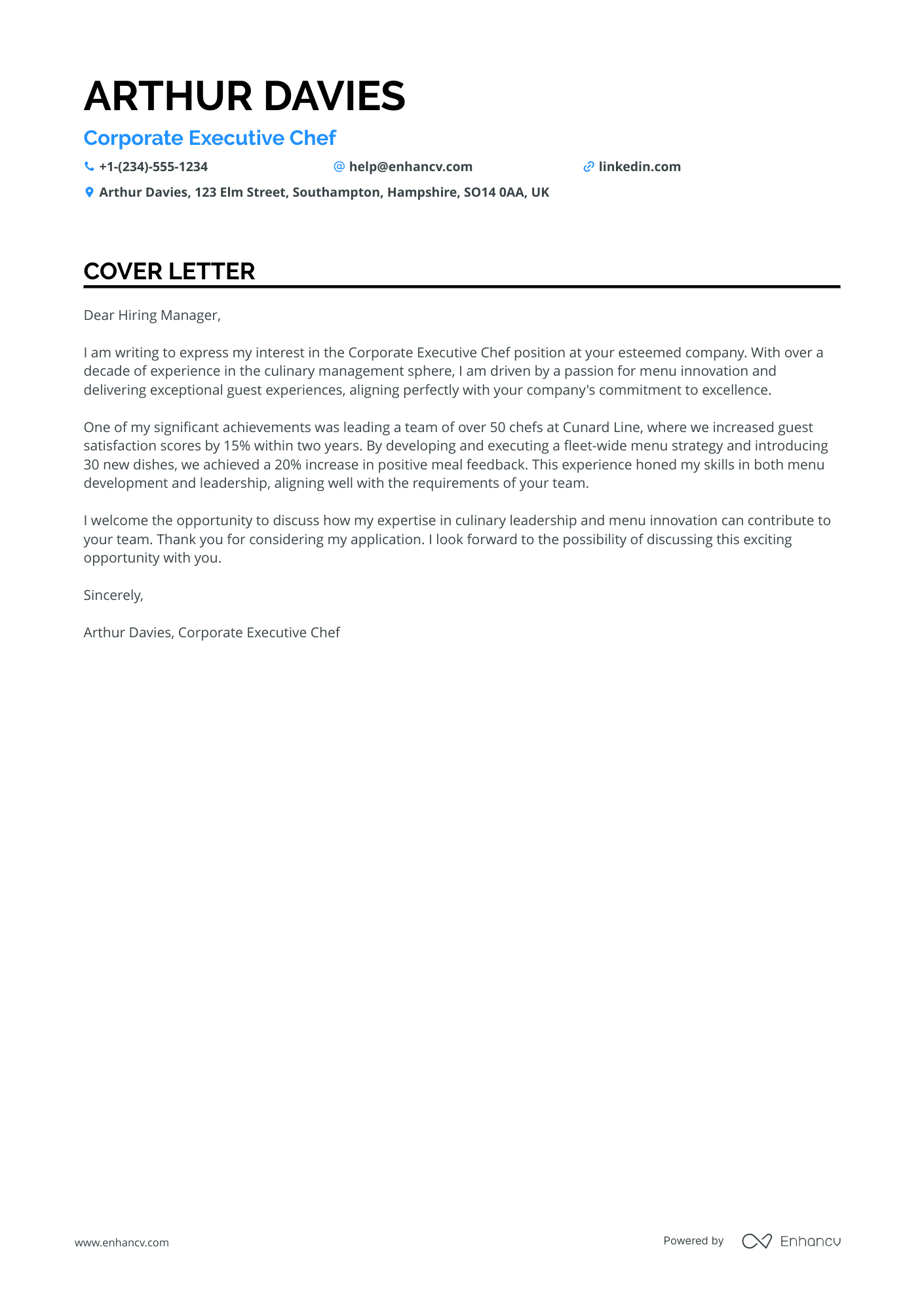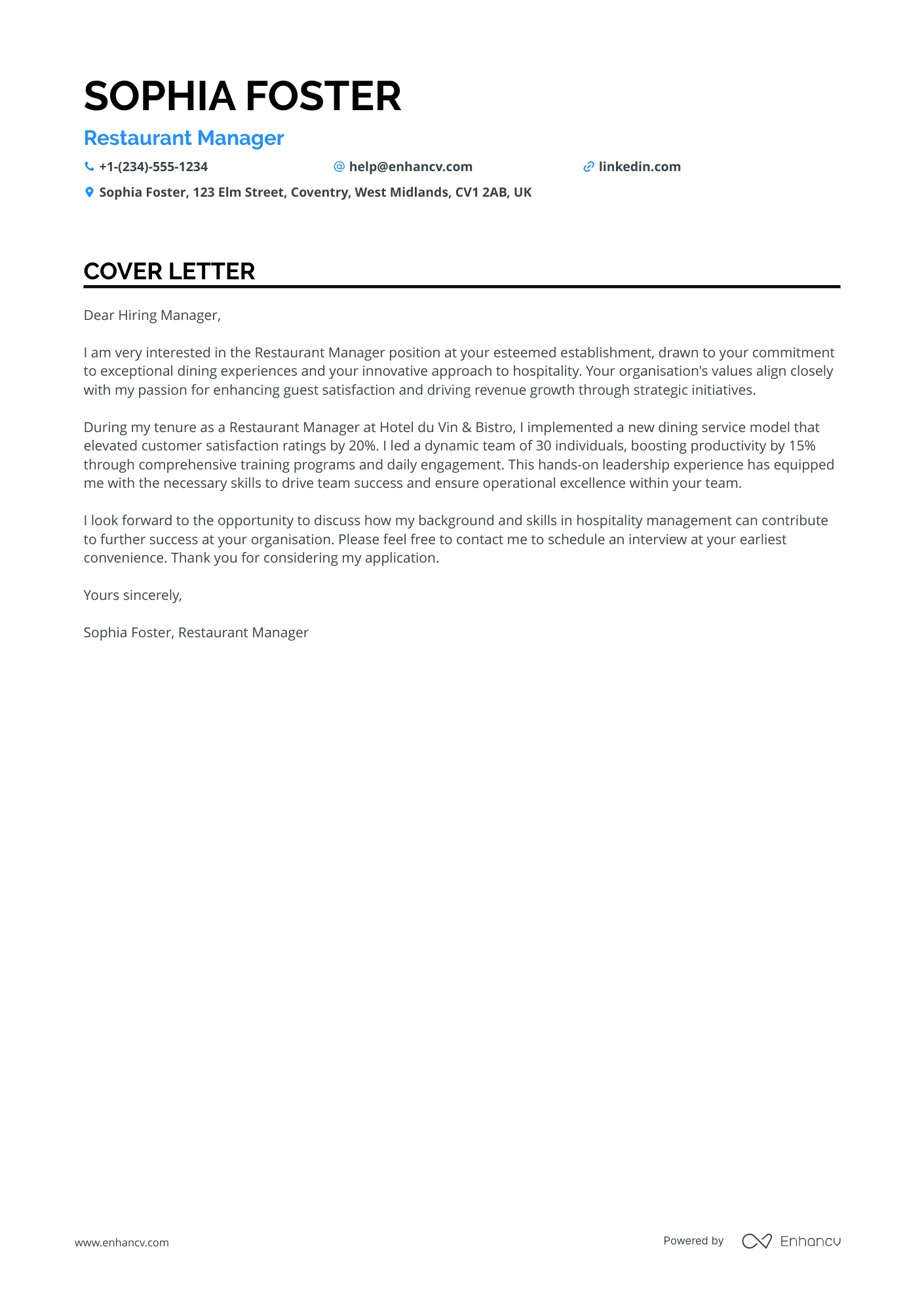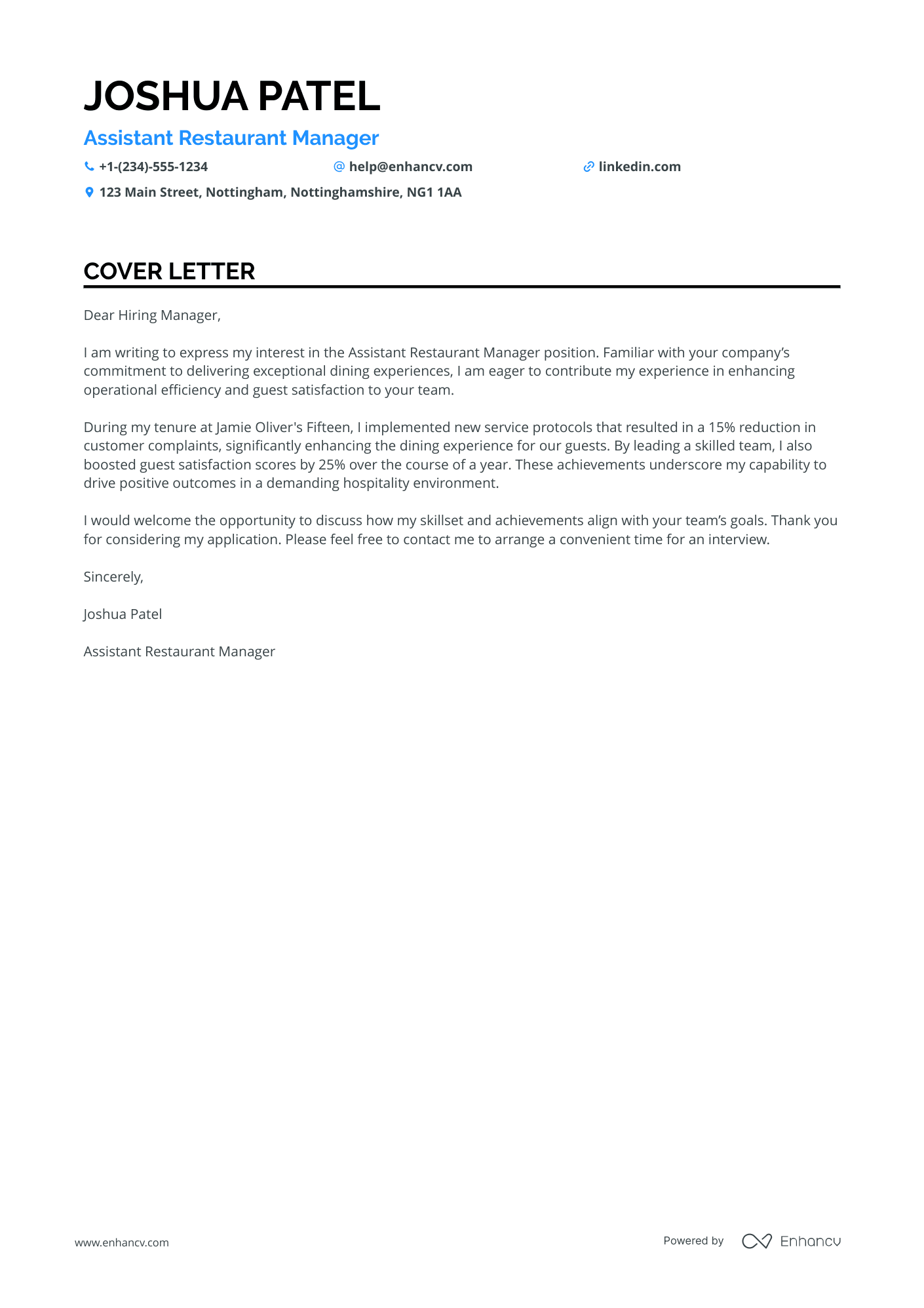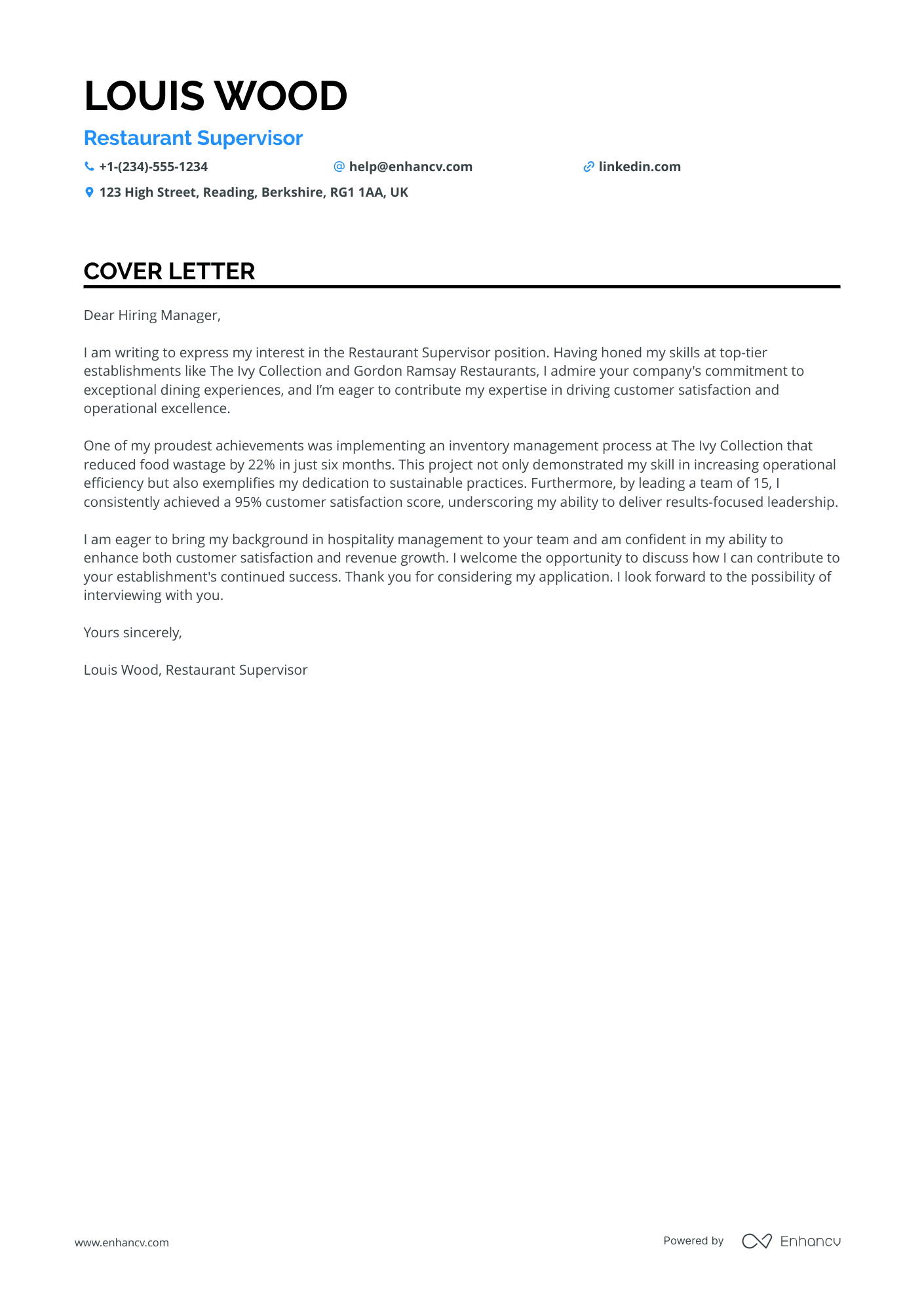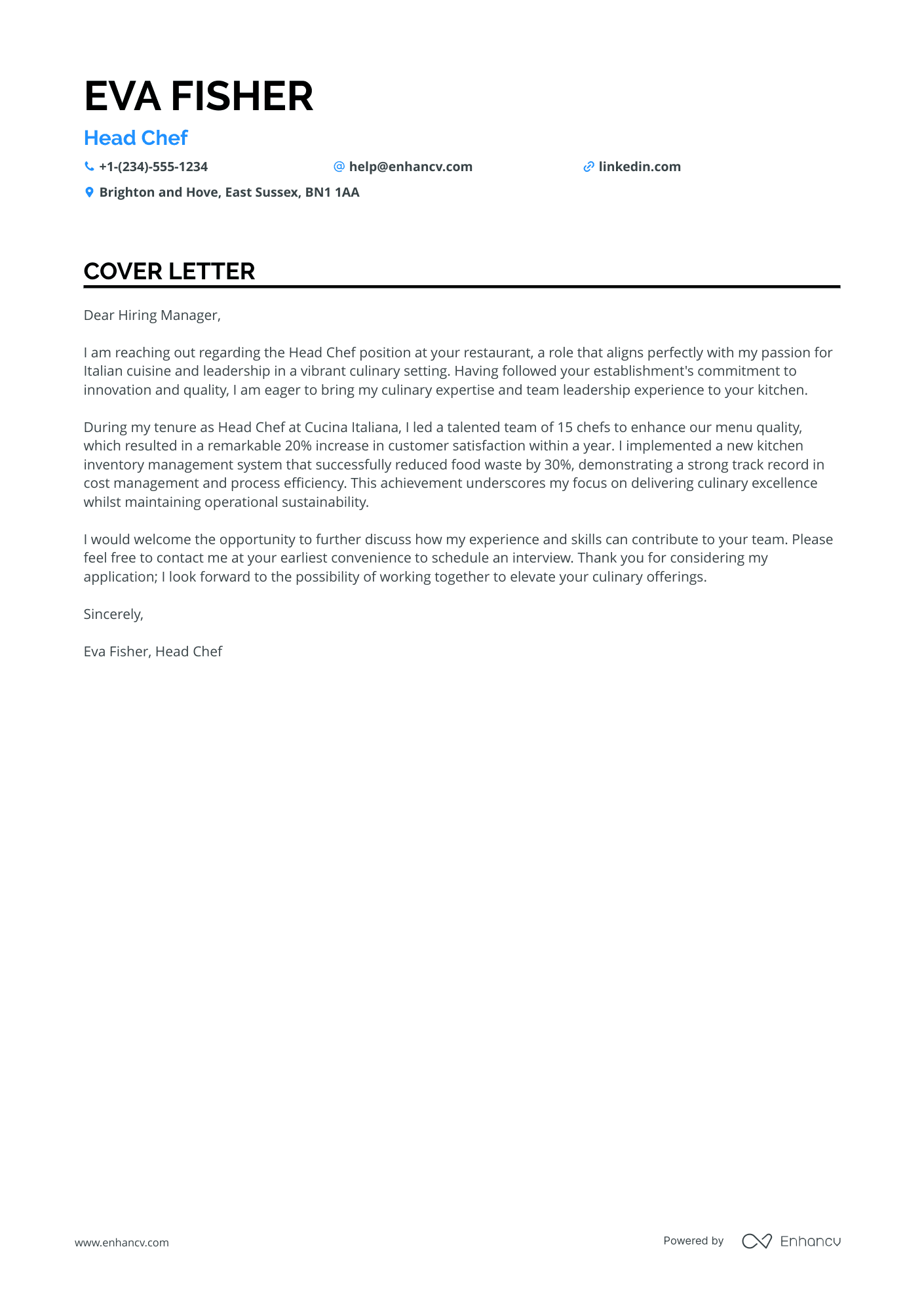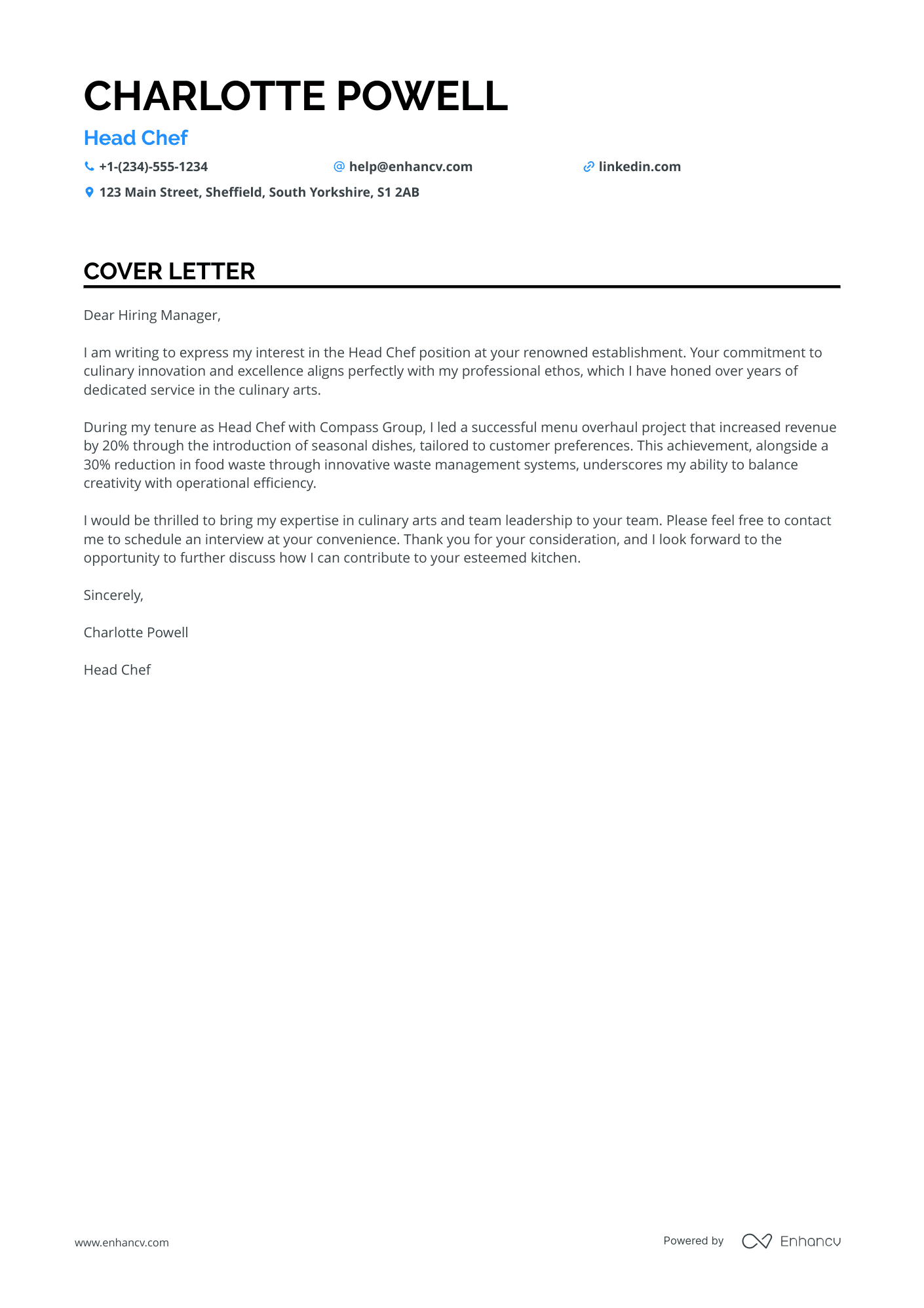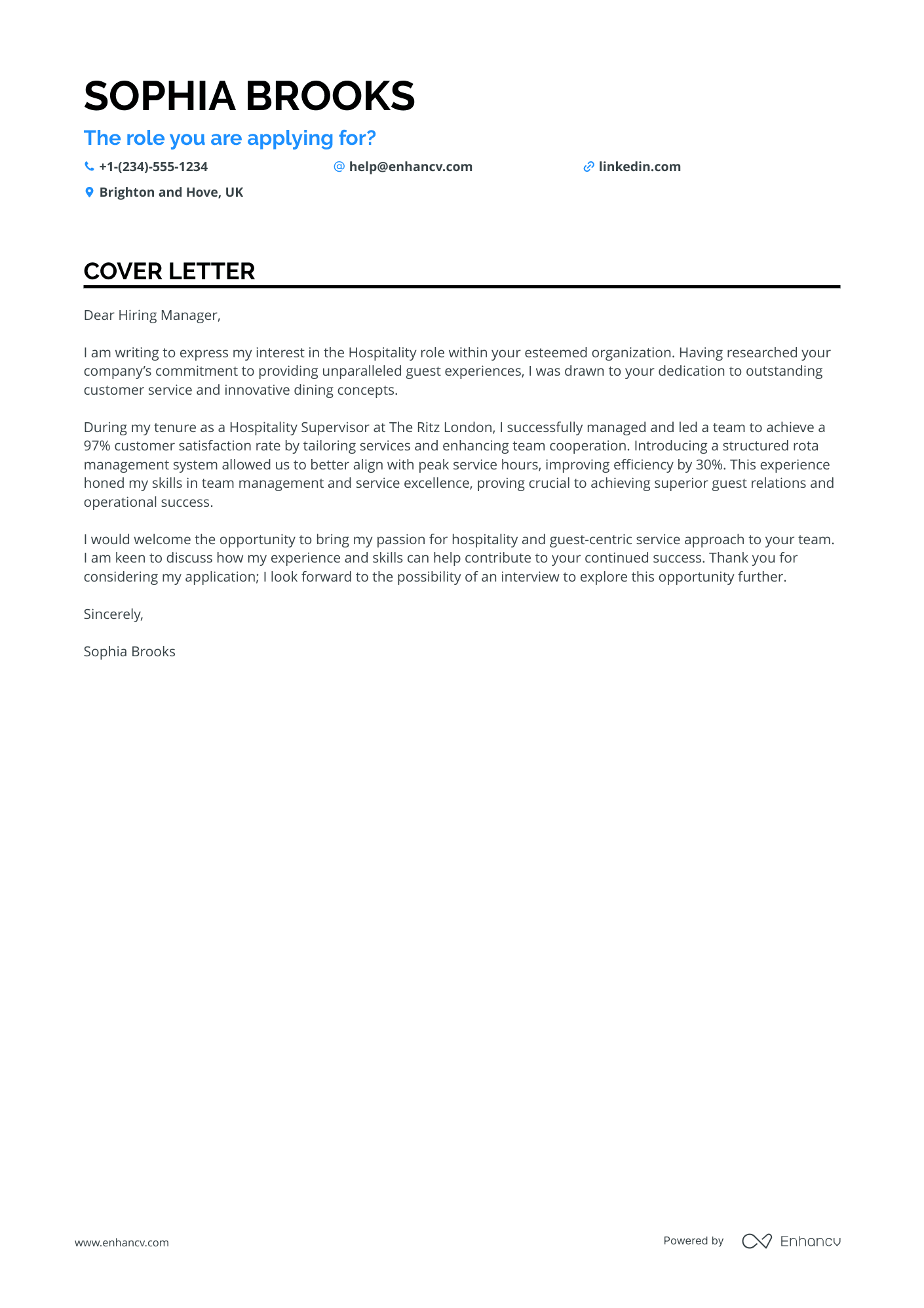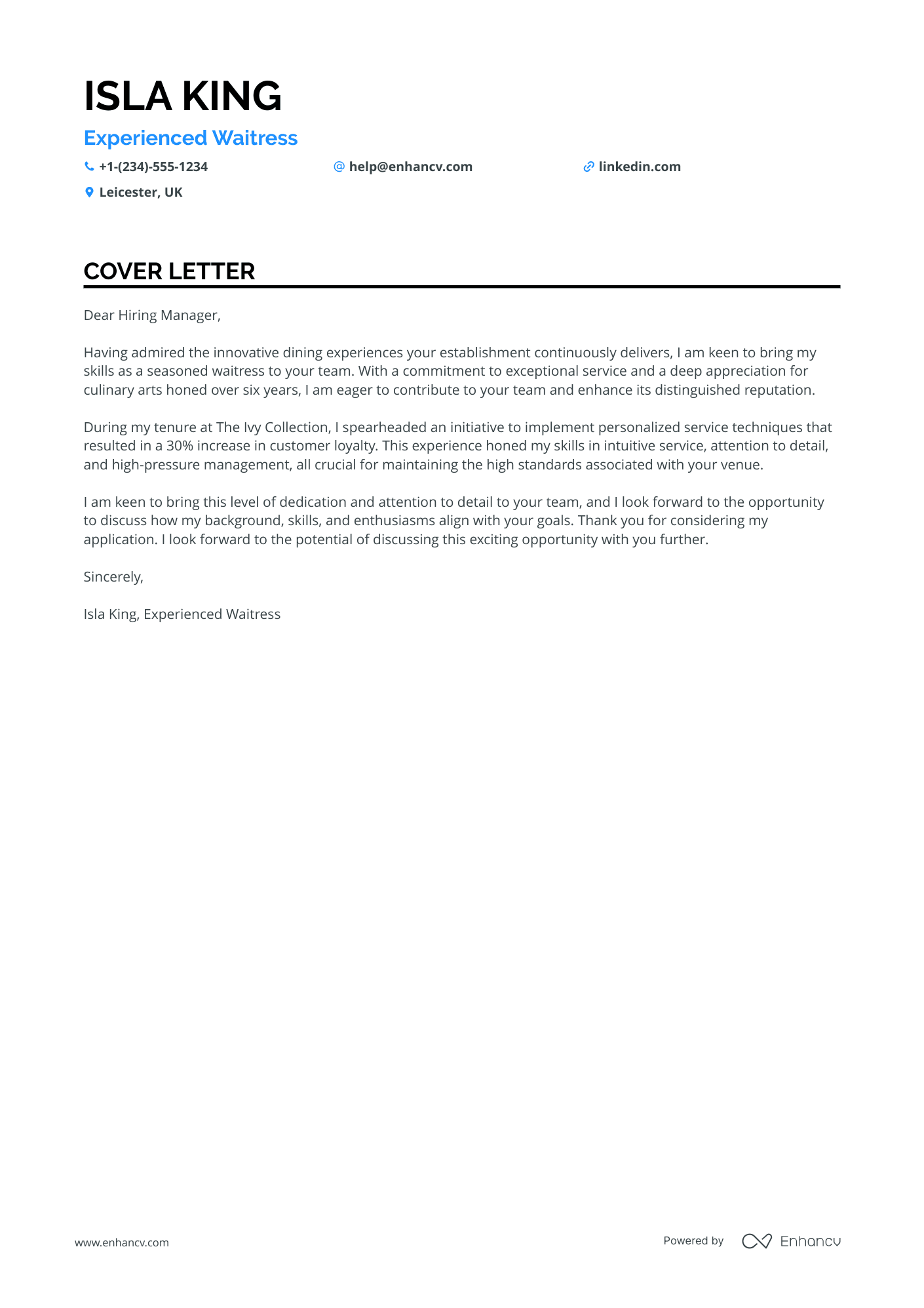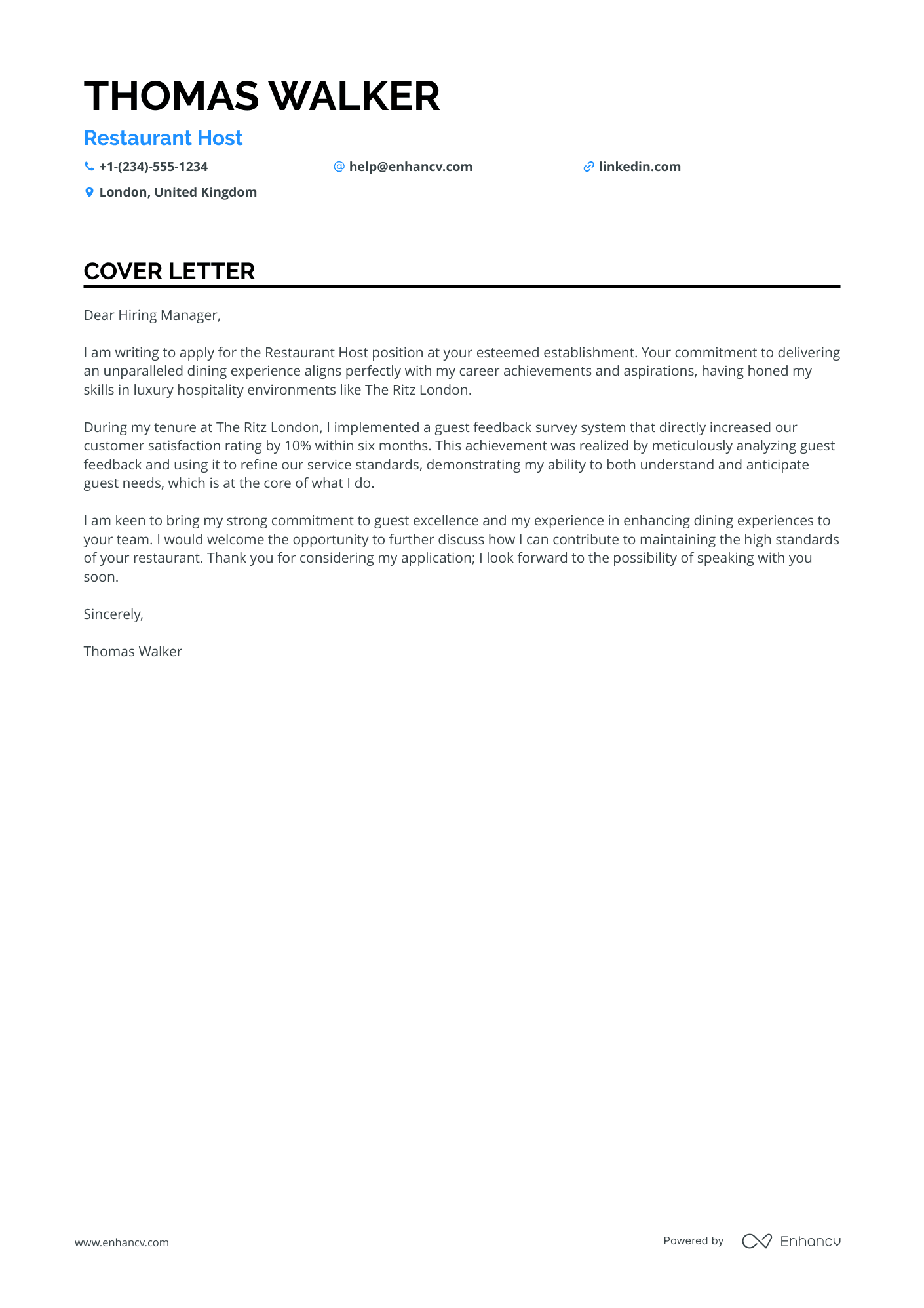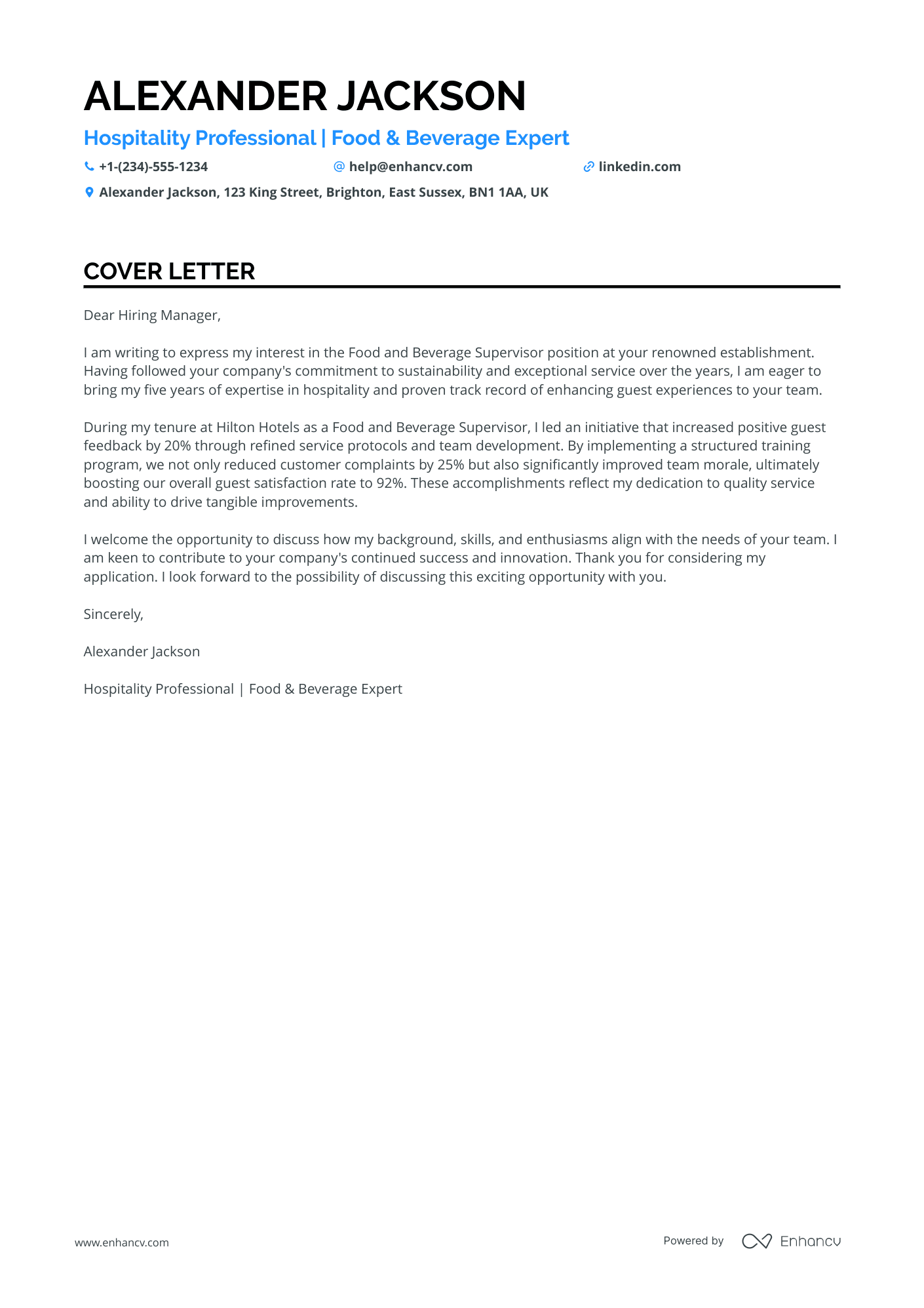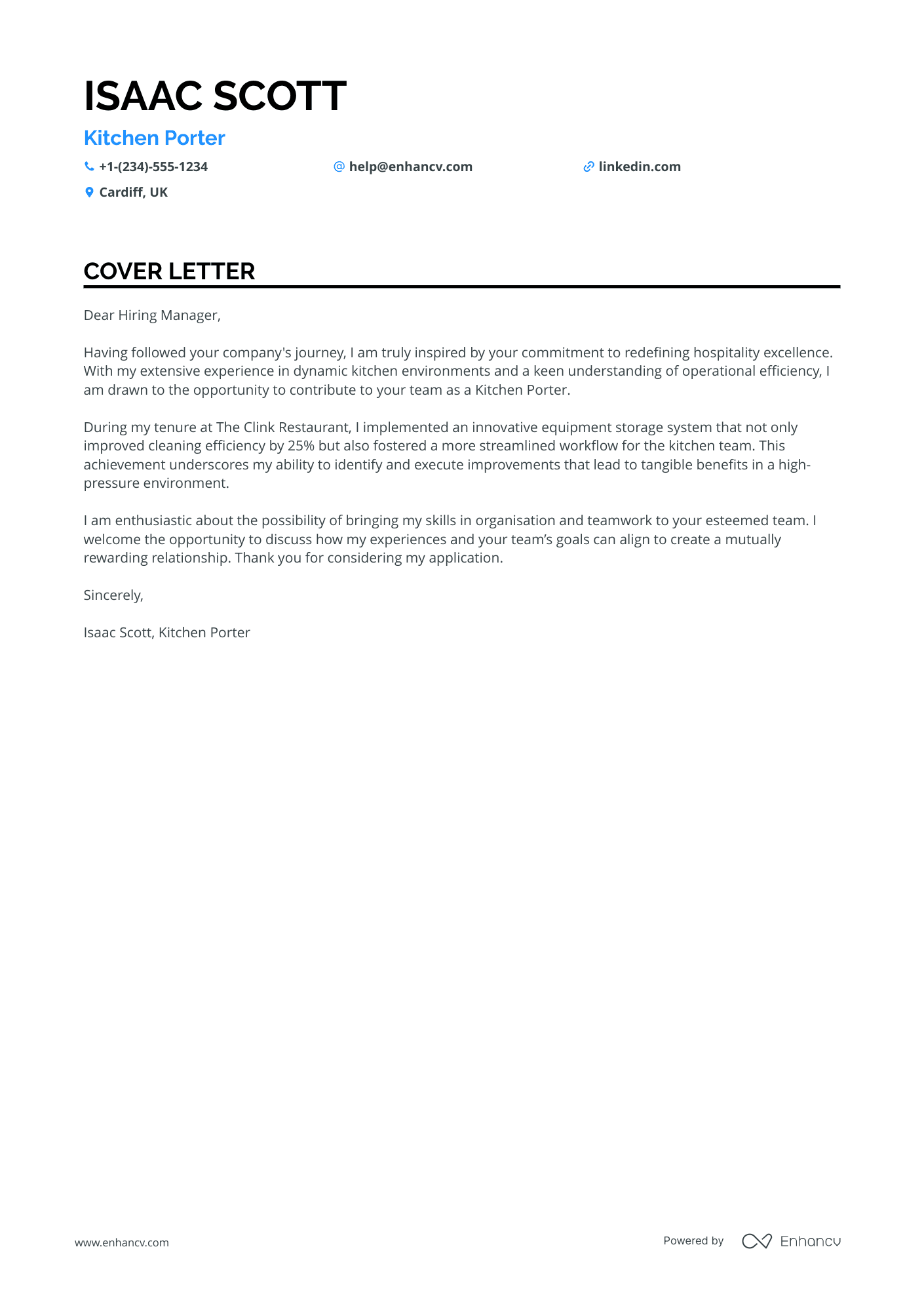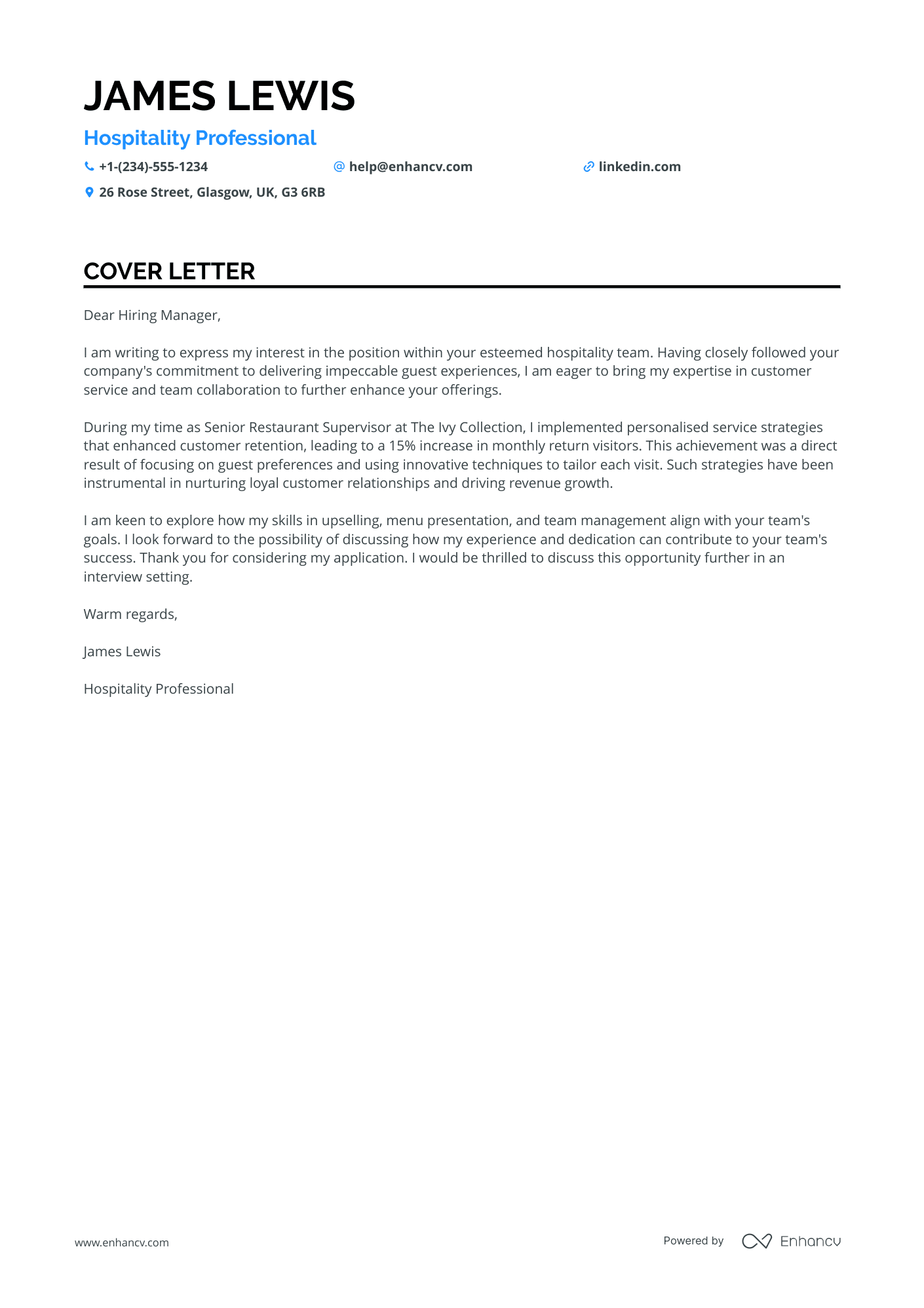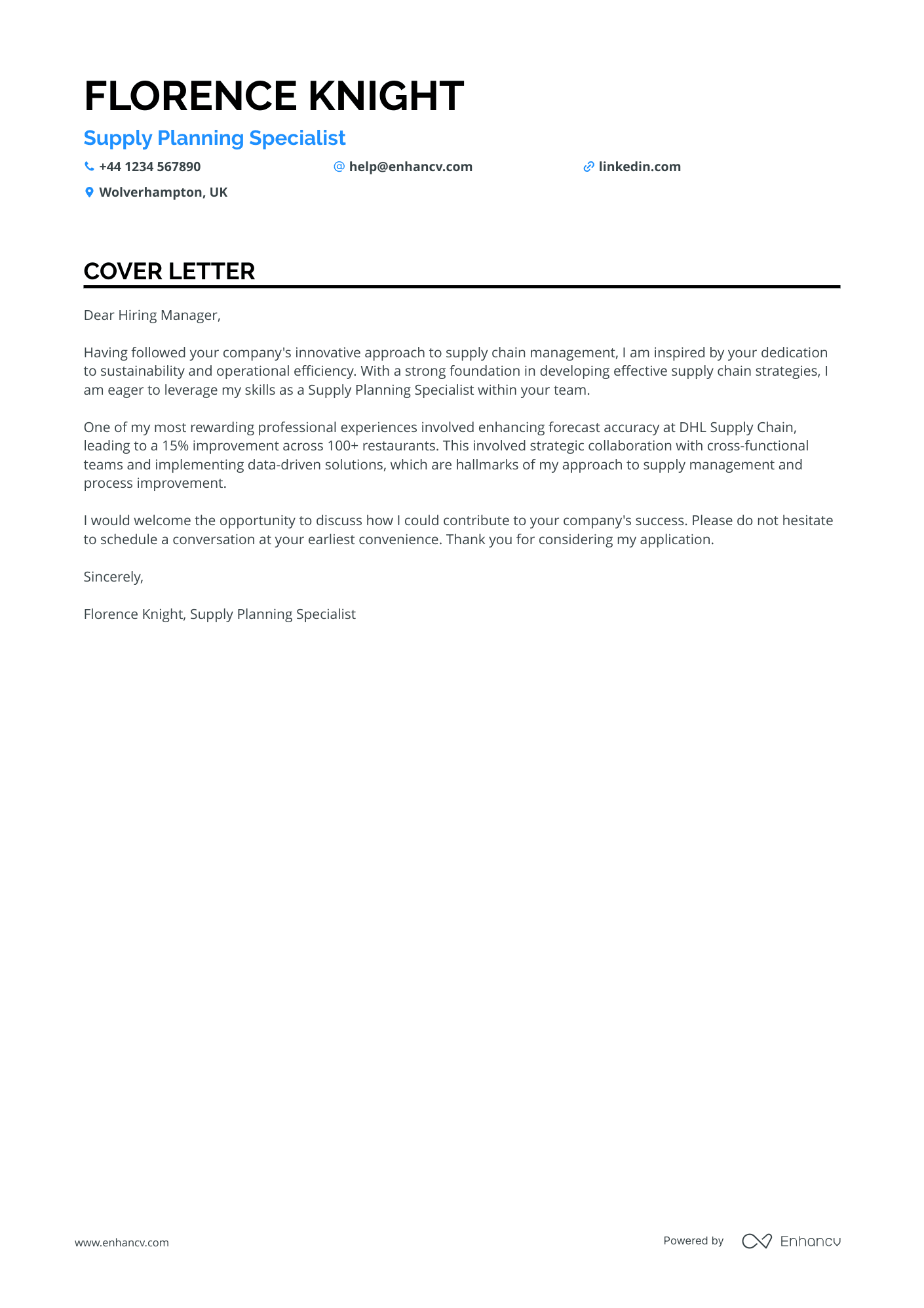You want your cover letter to strike the perfect balance between being professional and showing some personality. But how do you achieve this?
If you write too formally, your tone may come across as stiff. If you're too casual, it may sound overly conversational.
While modesty is always valued, how can you confidently present your skills without sounding arrogant or boastful?
This guide will help you find the right balance, ensuring your cover letter is both professional and personable, while focusing on the key job requirements.
Cover letter examples for restaurant
By Experience
Executive Chef in a Restaurant
- Highlighting the Advanced Culinary Innovation Certification from Le Cordon Bleu showcases expertise in cutting-edge culinary techniques, which is crucial for a role focused on menu innovation and culinary leadership.
- Emphasising achievements in guest satisfaction and cost reduction initiatives directly addresses key performance metrics relevant to corporate culinary roles.
- Noting leadership roles such as Head Executive Chef at Cunard Line, with responsibilities spanning fleet-wide menu strategy and team management, underlines leadership experience essential for top culinary positions.
- Including passions like Sustainable Food Practices and Travel and Culture offers insight into personal motivations and dedication to global culinary trends, aligning with the role’s requirements for innovation and cultural adaptability.
By Role
Restaurant Manager
- Highlighting relevant skills such as "Hospitality Management" and "Guest Service Excellence," which are critical for a Restaurant Manager's role.
- Emphasising the certified qualification in "Advanced Restaurant Management" from the Chartered Institute of Hospitality aligns the candidate's specialised knowledge with industry standards.
- Detailing achievements such as the "Efficiency Improvement Project" and "Sales Strategy Implementation" showcases the candidate's proven ability to drive revenue and improve efficiency.
- Mentioning a strategic initiative that led to a "25% increase in beverage sales year over year" demonstrates a successful ability to enhance profit margins in a competitive industry.
Restaurant Assistant Manager
- Highlighting Achievements: The cover letter effectively highlights specific achievements such as a 25% increase in guest satisfaction scores and an 18% revenue growth, showcasing the candidate's proven track record in enhancing operational performance and driving financial success.
- Relevant Certifications: Mentioning certifications, such as the Advanced Restaurant Management by Cornell University, serves to bolster credibility and indicates a commitment to ongoing professional development specific to the hospitality industry.
- Diverse Skill Set: The cover letter underscores a diverse range of skills including inventory management, operational efficiency, and team leadership, which are crucial aspects for an Assistant Restaurant Manager role and demonstrate readiness to handle complex restaurant operations.
- Passionate and Engaged: Inclusion of passions like Culinary Arts and Volunteering illustrates a well-rounded candidate who is deeply engaged with their field and committed to broader community and personal growth initiatives, making them a more appealing prospect for employers.
Restaurant Supervisor
- The candidate effectively highlights their extensive experience in customer service and hospitality, specifically as a Restaurant Supervisor with over 7 years in high-end environments, showing their capability to handle demanding roles.
- The cover letter stresses key achievements through quantifiable metrics, such as a 20% increase in guest satisfaction surveys and a 30% increase in weekend bookings, which demonstrate the applicant's ability to produce tangible results.
- The inclusion of specific skills relevant to the role, such as Food and Beverage Management, Inventory Management, and Team Leadership, illustrates the candidate's comprehensive expertise and readiness for the position.
- There is a clear emphasis on continuous professional development through courses like Advanced Food Safety and Hygiene and Hospitality Marketing Training, highlighting the candidate's commitment to maintaining advanced knowledge and skills in hospitality.
Restaurant Chef
- Emphasise leadership skills and team supervision examples, such as leading a team of 15 chefs and mentoring junior chefs, which are crucial for a Head Chef role.
- Highlight specific achievements, such as a 20% increase in customer satisfaction, to demonstrate impact and effectiveness in previous roles.
- Include awarded recognitions like the 'Menu Innovation Award' and 'Best Restaurant Team', underscoring the applicant's success and ability to achieve positive outcomes.
- Mention industry-relevant certifications, such as the Food Safety Management Certification, reflecting a strong commitment to maintaining impeccable standards in food safety.
Restaurant Sous Chef
- Highlight Certifications: Emphasising certifications in Food Safety and Hygiene, as well as Advanced Culinary Techniques, is crucial for appearing competent in maintaining high standards in food preparation and understanding modern culinary practices.
- Emphasise Leadership and Team Management: Demonstrating effective leadership skills and the ability to reduce onboarding time through a comprehensive training program are key to showcasing capability in maintaining an efficient kitchen operation.
- Focus on Innovation and Cost Management: Stressing achievements in menu innovation, which resulted in a 20% revenue increase, and efforts to reduce costs without compromising quality, underlines the ability to balance creativity with financial acumen.
- Acknowledge Achievements: Recognition for awards like 'Menu Innovation' and 'Best Cost Management' reinforces credibility and successful track record in the culinary management space.
Restaurant Waiter
- Highlighting Key Accomplishments: The cover letter effectively showcases Daisy's ability to increase customer satisfaction ratings, which is crucial in high-end dining environments. This is vital for employers looking for tangible evidence of past success in guest relations.
- Specific Hospitality Training: Mentioning advanced customer service techniques training and food hygiene certification demonstrates her commitment to maintaining high industry standards and enhances credibility in the hospitality field.
- Leadership and Team Management: Emphasising management experiences and responsibilities, such as training new staff and supervising teams, highlights Daisy's capability in leading and developing high-performance teams.
- Passion for Industry: Including personal passions related to hospitality, such as culinary arts and travel, adds depth to the application, suggesting a genuine enthusiasm for the industry beyond professional obligations.
Restaurant Waitress
- Highlighting specific achievements in customer satisfaction and sales growth, such as a 30% increase in customer loyalty and a 15% sales boost, demonstrates the candidate's direct impact on business performance.
- Emphasising advanced qualifications like a Master's degree in Hospitality Management and certifications in food hygiene underscores the candidate's commitment to industry standards and professional development.
- Detailing experience in high-pressure environments and successes in team leadership and staff training illustrates the candidate's ability to manage and improve service in dynamic settings.
- Including personal passions such as gourmet cuisine exploration and photography shows a well-rounded character, aligning personal interests with professional roles in hospitality and customer engagement.
Restaurant Host
- Highlighting Specific Achievements: The cover letter successfully underscores the candidate's quantifiable impact, such as boosting revenue by 20% and enhancing customer satisfaction by 10%, which are crucial indicators of performance in luxury hospitality roles.
- Relevant Certifications: The inclusion of courses like 'Advanced Hospitality Customer Service' from the London Hospitality Academy adds credibility and demonstrates specialised training tailored to luxury service environments.
- Emphasis on Key Skills: Mentioning skills such as 'Luxury service', 'Guest experience management', and 'Upselling techniques' directly aligns with the role of a Restaurant Host, highlighting the candidate's suitability for the position.
- Education and Experience Alignment: The cover letter aligns the candidate’s educational background in Hospitality and Tourism Management with extensive professional experience at prestigious establishments, reinforcing their expertise in the luxury hospitality sector.
Restaurant Food and Beverage Manager
- Emphasise Key Achievements: Showcase specific achievements such as a 20% increase in customer satisfaction and a 30% rise in upselling beverages to highlight effectiveness in improving guest experiences and boosting revenue.
- Highlight Relevant Experience: Provide detailed experiences that reflect roles in leadership and service optimisation, like leading teams and implementing training programmes that reduce customer complaints by 25%.
- Education and Professional Development: Mention relevant academic credentials, such as a Master's in Hospitality Management, and supplementary courses like Advanced Wine & Spirit Education to demonstrate commitment to continuous learning and expertise development.
- Sustainability and Innovation: Express interest in sustainable practices and culinary arts appreciation, linking these passions to strategic initiatives like waste reduction and menu development that also reflect industry trends.
Restaurant Dishwasher
- Highlighting Experience: Mentioning data-driven achievements, such as the 25% improvement in kitchen cleaning efficiency, is compelling evidence of the candidate’s contribution and impact in their role, which is crucial for a Kitchen Porter.
- Specialised Skills: Emphasising skills such as stock rotation and health and safety is vital for a role focused on maintaining kitchen standards, ensuring the candidate stands out for their organisational capabilities.
- Educational Background: Including educational credentials, such as the Master of Arts in Hospitality Management, underscores the candidate's formal training and commitment to the hospitality industry.
- Certifications in Food Safety: Noting specific courses like the Level 2 Food Safety in Catering certification enhances credibility and shows preparedness for adhering to critical health standards in a kitchen environment.
Restaurant Server
- Highlighting Achievements: The cover letter effectively showcases specific achievements, such as implementing personalised service strategies and orchestrating specialised seasonal menus, demonstrating the candidate's proactive impact on customer satisfaction and sales growth.
- Emphasising Relevant Experience: The candidate details experience across various hospitality roles, underscoring their capability in customer service and team management, which are critical for a Hospitality Professional.
- Relevance of Certifications and Courses: Mention of certifications like the "Advanced Food and Beverage Management" from Cornell University supports the candidate's expertise, adding credibility to their skill set in the hospitality industry.
- Passion Alignment: Aligning personal passions, such as "Culinary Exploration" and "Modern Mixology," with professional skills provides a holistic view of the candidate, showcasing their dedication and enthusiasm for the hospitality field.
Restaurant cover letter example
Florence Knight
Wolverhampton, UK
+44 1234 567890
help@enhancv.com
- Mention specific achievements (e.g., enhancing forecast accuracy by 15%) to demonstrate impact and relevance to the role.
- Highlight experience with cross-functional team collaboration, which is crucial in supply chain and planning roles.
- Emphasize alignment with the company's values, such as commitment to sustainability and operational efficiency.
- Express eagerness to discuss further and proactively offer to connect, showcasing enthusiasm and initiative.
Importance of cover letters in the United Kingdom
Cover letters provide recruiters with the opportunity to learn more about your career aspirations, hinting at how you’d integrate within the organisation over the long term.
Here are three additional reasons why cover letters are important:
- Making an excellent first impression (and a formal introduction): Your cover letter is often the employer’s first introduction to you, showcasing your personality, communication skills, and motivation for the role.
- Complementing your career history: While your CV lists qualifications and experience, a cover letter provides the context, explaining how your background fits the role.
- Demonstrates your genuine interest: A well-crafted cover letter reflects the effort you’ve put into researching the company and role as well as your attention to detail.
What UK employers expect from a cover letter
When writing your cover letter for a UK employer, it’s important to keep several things in mind. First, you need to conduct a thorough research, which includes reading up on the company’s website, recent news, and their presence on social media. Understanding the company’s latest achievements and its overall mission will allow you to tailor your letter to their specific needs.
Next, focus on the company’s core values. Whether they value teamwork, innovation, or community involvement, highlighting how your own experience aligns with these principles is essential.
Finally, don’t forget to match your skills to the job’s requirements. Study the job description carefully and pick out the most important qualifications or competencies. Then, provide evidence of how you meet those criteria with concrete examples from your past work experience.
How to format a restaurant cover letter
Have you ever wondered about the formatting and structure of your cover letter?
Read on to discover some guidance from industry-leading professionals:
- Within the header, include your address and contact details, the employer's name and address, and the date, followed up by a personalised salutation.
- The body should should consist of an opening paragraph, middle paragraphs expanding on your unique experience and skills, and a closing paragraph.
- End with a formal sign-off and your signature.
- Choose modern fonts such as Volkhov, Chivo, or Bitter instead of the more traditional Arial or Times New Roman.
- All of ENhancv's templates maintain single-spacing with approximately 1-inch (2.5 cm) margins on all sides to ensure a neat presentation.
- Always send your cover letter as a PDF to keep the formatting intact and prevent any edits once submitted.
Your CV and cover letter maintain consistent formatting. Use the same fonts, margins, and style to create a professional and cohesive look for your application.
Finally, remember that Applicant Tracking Systems (the software some companies use to align job keywords to your experience, also known as ATS) do not read cover letters–it's intended solely for recruiters. Make it stand out by highlighting your achievements and relevant skills for the role.
How to write your restaurant cover letter salutation
It's never advisable to begin your cover letter with 'Dear Sir/Madam', as it sounds comes across as impersonal.
Take the time to find out who is hiring for the role and address them directly in your cover letter greeting (e.g., 'Dear Mrs Chanceworth', 'Dear Harrod').
If you're uncertain where to find the hiring manager’s name, check the company website, look on LinkedIn, or send a courteous email requesting this information. Don't hesitate to ring reception either—they are unlikely to refuse to assist.
How to write your restaurant cover letter intro
It's never a bad time to show enthusiasm about the role, company, or team in your cover letter introduction.
Begin by sharing one or two aspects that genuinely excite you about the position—whether it's the company culture, specific responsibilities, or the team's past achievements.
Your enthusiasm demonstrates that you'll bring a strong work ethic, are eager to contribute, and are motivated to succeed.
How to write your restaurant cover letter body
Your cover letter body is the most spacious and vital part of this document—it highlights your true value and the impact you can bring as a candidate.
Remember, your cover letter serves a different purpose to your CV. Here, you need to show your skills in context by telling the story of one significant achievement, hinting at how you’ll help your future employer achieve their goals.
So, when writing your cover letter body:
- Use concrete achievements to demonstrate your personality and impact.
- Support your achievements with quantifiable data and metrics.
- Tell the story of a successful project you’ve worked on and explain how you contributed to the outcome.
- Highlight both hard and soft skills to make your story more engaging.
- Focus on skills that are most relevant to the role and align with the company’s needs.
How to write a closing paragraph
You’ve written a brilliant cover letter so far—so don’t undermine it at the very end.
If you think signing off with a polite 'Kind regards' or 'I look forward to hearing from you' will make a strong impression, think again.
A better approach is to make a tangible promise—one that reflects both personal and professional growth—and demonstrates your value to the recruiters.
Alternatively, encourage the hiring managers by asking when you might expect to hear back from them.
Conclusion
A well-crafted cover letter can significantly enhance your job application and set you apart from other candidates. Begin by personalising your message to the hiring manager and connecting your experiences to the company's values.
Emphasise your key accomplishments that reflect your skills and passion for the role, while maintaining a professional tone throughout. Ensure that your cover letter and CV present a unified and polished image to maximise your chances of success.
